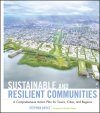About this book
Many of today's communities face an unprecedented struggle to adapt and maintain their environmental, economic, and social well-being in an era beleaguered by fiscal constraints, uncertainty about energy prices and supplies, rapid demographic shifts, and accelerated climate impacts. Sustainable and Resilient Communities is a step-by-step guidebook for urban planners and urban designers explains how to create and implement an actionable plan for making neighborhoods, communities, and regions more environmentally healthy, resource-conserving, and economically resilient.
Sustainable and Resilient Communities delineates measures for repairing, retrofitting, and transforming our built environments and supporting systems – transportation, energy, water, natural environment, food production, solid waste, and economics – through:
- Methods for assessing a community's key sustainability quotient
- Deploying tools for establishing timely performance goals and metrics
- Developing strategies for evaluating, selecting, and implementing 'high-leverage' interventions
- Activating policies, codes, programs, plans, and practices, as well as monitoring and upgrading their performance
Sustainable and Resilient Communities includes a range of targeted case studies, from New Orleans and South Carolina to Arizona and California, illustrating geographically diverse approaches for urban contexts large and small. A resource for developing an ecological urbanism, Sustainable and Resilient Communities employs time-proven, broadly applicable strategies and actions that can be customized for specific environmental, energy, and economic conditions.
Read a sample chapter below:
Contents
Foreword
Acknowledgments
Introduction
Chapter 1. The Built Environments and Supporting Systems
Chapter 2. The Process of Transformation
Chapter 3. The Physical Built Environment
Chapter 4. The Regulatory Environment
Chapter 5. Transportation
Chapter 6. Energy
Chapter 7. Water
Chapter 8. Natural Environment
Chapter 9. Food Production/Agriculture
Chapter 10. Solid Waste
Chapter 11. Economics
Chapter 12. Engagement and Education
Chapter 13. Public Health
Appendix
Endnotes
Contributors
Index
Customer Reviews
Biography
Stephen J Coyle, AIA, LEED AP, founder and principal of Town-Green [www.town-green.com] based in Oakland, California, and cofounder of the National Charrette Institute [www.charretteinstitute.org] and Townworks/DPZ [www.townworks.org], is an architect, urbanist, and community planner. Coyle and his colleagues design and repair landscapes, buildings, neighborhoods, and cities throughout the United States and Southeast Asia. As co-designer of the award-winning Contra Costa Centre Transit Village, Coyle developed sustainability plans for Hayward, Gilroy, Martinez, Napa, Pleasanton, and Tracy, California. With Bill Lennertz, Coyle helped to "green" Portland and other Oregon communities through New Urbanist plans and form-based codes.
Daniel Dunigan, AICP, LEED AP, closely collaborated with Steve Coyle on the creation of this book. Dunigan, an urban designer with Town-Green, has a wide range of professional experience including climate action planning, public outreach and charrette facilitation, urban design master planning, detailed architectural specification, and all phases of design/build project management.



































